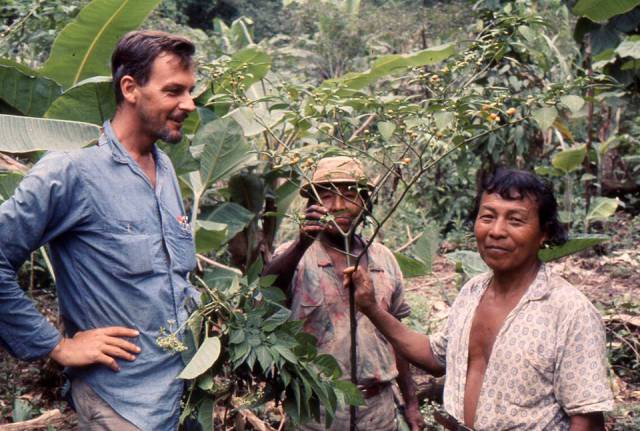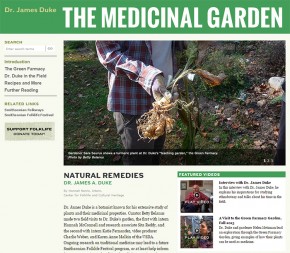The Medicinal Garden Exhibition

Being in Washington, D.C., is very exciting for me, especially when it involves an internship at the Center for Folklife and Cultural Heritage. Besides what I’ve learned from working on projects and getting a glimpse of how this thriving unit operates, I have relearned the importance of eating my vegetables—thanks to a project initiated by my supervisor, Betty Belanus.
Betty and a few others from the Center had made two trips Fulton, Maryland, to visit the garden of Dr. James Duke, a botanist known for his extensive study of plants and their medicinal properties. As part of background research for a possible future Smithsonian Folklife Festival themed around medical traditions, our media specialist Charlie Weber filmed an interview with Dr. Duke and a tour of the garden; the videos were recently edited by his intern Courtney Adkisson. From watching the two videos, it is clear that Dr. Duke has a real passion for learning about the medicinal potential of herbs and sharing that knowledge with others.
In preparation for synthesizing the videos, photos, and other resources into one online exhibition, I began researching Dr. Duke’s work by reading his website, earlier blog posts on visits to the garden, and Dr. Duke’s book, The Green Pharmacy. In addition to learning more about his life and career, I learned of herbal remedies for conditions ranging from athlete’s foot to high blood pressure to tonsillitis (all of which involve garlic, by the way).
Through my research, I was reminded of the importance of respecting and valuing the practices of others, even if different than our own. Much of what inspired and informed Dr. Duke was his time in Latin America, learning from people of different cultures. For instance, the Kuna people of Panama have relied on plants for healing for ages.
Using plants for medicine as they do is a somewhat foreign idea to me, having grown up in a society dependent on drugs that come in wrappers, boxes, and bottles. But according to Dr. Duke’s research and personal beliefs, the natural medicinal traditions like those of the Kuna are better for the body than our synthetic ones.
Whether or not this projects leads to a future Folklife Festival program, the online exhibition The Medicinal Garden: Dr. James Duke should be a helpful resource. His years of research at home and abroad as well as his experience recommending herbal remedies provide a vast sum of resources for anyone interested in natural medicine, and I hope that you enjoy learning more about this topic as much as I have.
Hannah Norris is a student at Whitworth University in Spokane, Washington, majoring in Spanish and cross-cultural studies. She spent the January term of 2015 as a research intern at the Center for Folklife and Cultural Heritage.


